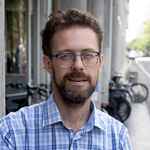Study programme
-
Doing Jewish StudiesPeriod 1Period 212
The Master's in Jewish Studies is built around two core components: 1. Doing Jewish Studies: this core course offers an in-depth introduction to academic Jewish Studies as a profession. Centering on concrete historical cases and sources, it is designed to help you place your area of specialisation within the broader field, both historically and theoretically. You will acquire a broad repertoire of scholarly approaches, which you will learn to apply in your own research trajectory. 2. Term paper: the term paper is connected to the Winterschool in Hebrew and Jewish Studies, which offers an interdisciplinary exploration of a selected theme through a combination of lectures, reading groups, site visits and ateliers.
-
Winterschool in Jewish StudiesPeriod 36
The programme includes the International Winter School in Jewish Studies: one week with staff and students on a location somewhere else in Europe or Israel, together with students from the Open University of Israel and Sorbonne Université (Paris). Centred around a challenging theme, lectures, excursions and meetings with local Jewish communities and heritage institutions are offered
-
ElectivesPeriod 1Period 2Period 4Period 524
The 24 credits can be completed as follows: a) the two program-bound electives (Ancient Judaism and A History of Modern Israel ) and the two externally funded tutorials in Yiddish; b) free choice electives from the broader offerings of the faculty/university; c) two tailor-made tutorials; d) internships. Students are free to compose their package within the framework of these four options.
-
Master's Thesis Hebrew and Jewish StudiesPeriod 4Period 5Period 618
In the Master's thesis you report on research which you carry out under the supervision of an academic staff member involved in the programme. In the electives you can prepare for the topic you wish to explore and master the tools to tackle it.
-
Excursion: the International Winter School in Jewish Studies
The programme includes the International Winter School in Jewish Studies: one week with staff and students on a location somewhere else in Europe or Israel, together with students from the Open University of Israel and King’s College London. Centred around a challenging theme, lectures, excursions and meetings with local Jewish communities and heritage institutions are offered
-
Internships
Internships are possible in the Amsterdam Jewish heritage institutions, but also at universities, libraries, media, ministries, or NGOs, both in the Netherlands and abroad. For information on available internships and the experiences of other student interns, please consult prof. Irene Zwiep, or check out the information on internships for international students in the A-Z list.
-
Credit transfer
Students who show exceptional promise during a regular or professional Master's programme are encouraged to continue their studies in a research Master's programme. Once students are admitted to the research Master's programme, they can transfer credits earned during their previous course of study towards their Research Master's degree. The Examinations Board determines which courses qualify for transfer.

Amsterdam lives and breathes Jewish Studies.Anne-Mieke van Strien, student Read the interview
-
Can I follow classes online?
Tutorials are planned in conjunction of students and professors and can be online. The regular classes are live and in-class.
-
How many students does this programme have?
The programme attracts yearly some 10 to 15 students.
-
Do I have to know Hebrew?
No, the programme does not require Hebrew knowledge, as many topics within Jewish studies can be studied without. Students who do master Hebrew will be given ample opportunity to work with Hebrew sources. Also other Jewish languages, like Yiddish and Ladino, next to languages such as English, (Judeo-)Arabic, German, French, Spanish and Portuguese can be used throughout the programme.
-
Do I have to be Jewish?
No, the student body is very diverse, including Jews and non-Jews, ranging from Orthodox to secular Jews, people of other faiths and none. Also in terms of nationalities, students hail from many different countries.
-
Can I combine this Master's with other programmes?
Yes, the tailor-made programme makes this Master's especially suited for combining with other programmes, including research masters.
-
Why should I do Jewish studies in Amsterdam?
Because Amsterdam is Mokum, a historical Jewish city with tremendous Jewish collections awaiting new generations of researchers, dynamic Jewish cultural institutions and a vital Jewish life. Our department consists of inspiring teachers and scholars, who love to introduce you into the field of Jewish studies.
-
What does Amsterdam offer Jewish students?
Our department is a diverse and inclusive environment in which Jewish students feel safe and free to express their identities. The Amsterdam Jewish community is also welcoming students from abroad and supporting them to feel at home in the city. In case you have specific questions on this topic, feel free to contact the programme coordinators.

Embedded in the rich infrastructure of Amsterdam's Jewish heritage collections, this Master's offers students the unique opportunity to develop their own research profile in the broad field of Jewish Studies. Each student gets a tailor-made program, ranging from Hebrew Bible to contemporary American Jews, early modern Yiddish to mystical kabbalah, from Amsterdam Jewish history to Arab Jews.Dr Bart Wallet